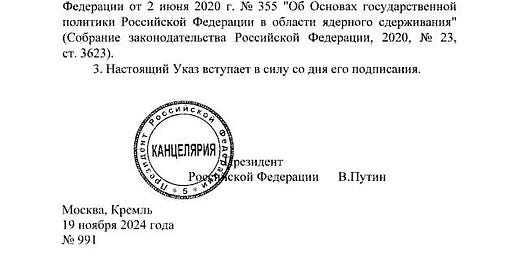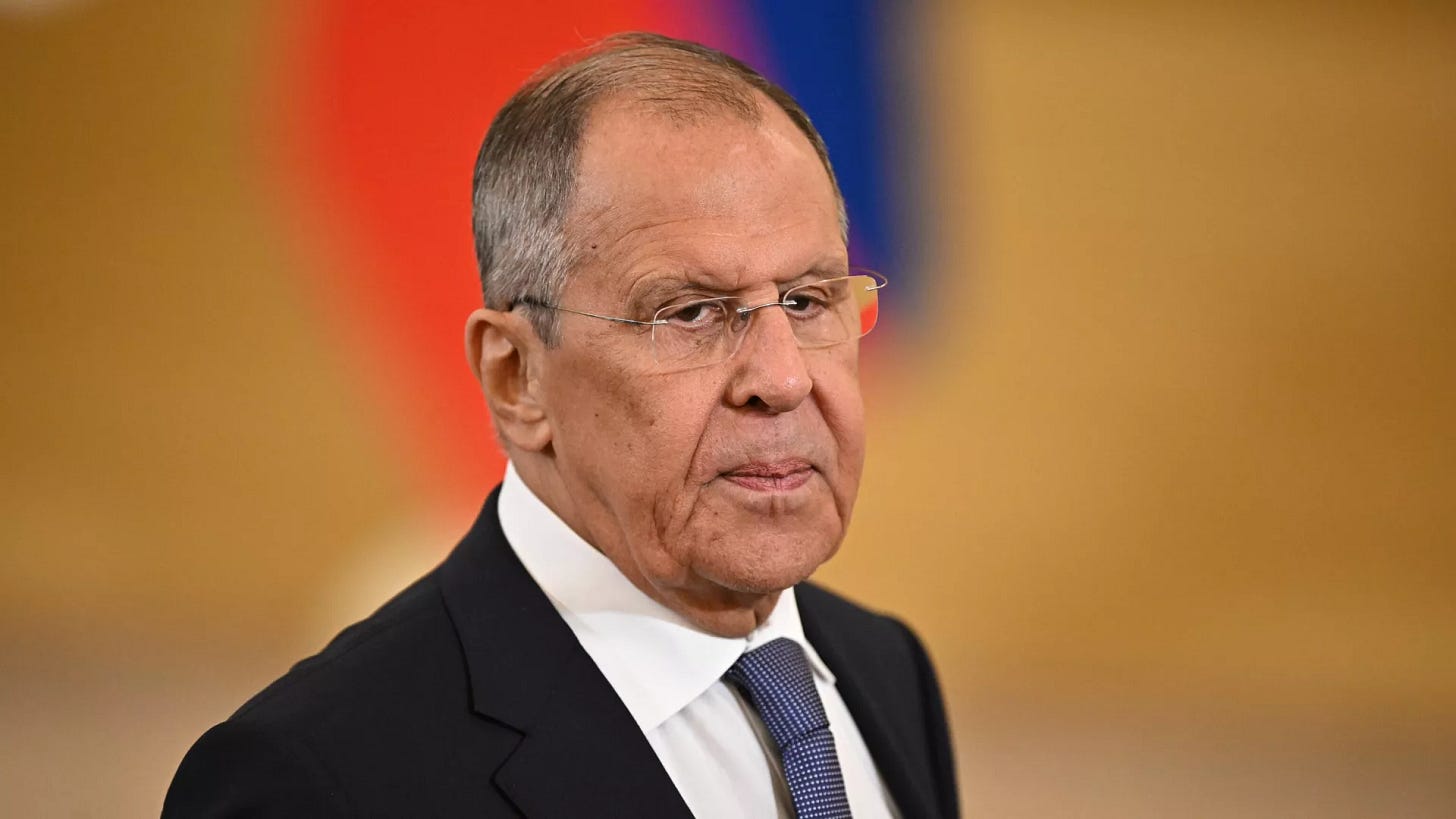The long-range missile story gets more complicated
...plus statements by Dmitry Medvedev and Sergei Lavrov on the recent developments in the Russo-Ukrainian war.
What follows is my English translation of a post, originally in Italian, by Nilo Vlas on his Telegram channel (all emphasis mine, except for the title):
The long-range missile story gets more complicated
The White House confirms halfway through the rumours of a third-rate official. The newspapers, which had first announced the news, go back on their word, but then spread rumours that the permission to use the missiles only concerns the Kursk region and specifically the Korean troops stationed there.
During the night, however, 6 ATACMS missiles were fired at the Bryansk region, not the Kursk region (of which 5 were shot down, according to the Russian Ministry of Defence). They were aimed at an ammunition depot more than 100 kilometres away from the border. [See this Sputnik article]
For now, all this has the appearance of a dig to test Moscow's patience once again. The Americans spread the news by the back door, so as not to compromise Biden and always to be able to retract, while the regime media spread deliberately contradictory information. The missile attack to test Russian endurance is there, but in Russia it surprises no one, as the Bryansk region has long been under constant attack by other weapons systems (drones, missile artillery) and conceptually last night's attack changes little.
Everything will now depend on the Russian response. If Moscow shows zero tolerance for these provocations and responds in kind, I imagine that in a few days' time we will see Biden claiming that he “never gave such an order”, and all the responsibility will once again be dumped on Zelensky. If not, the missile attacks will continue, and no longer only in the border regions, but throughout European Russia all the way to Moscow.
Let us see if this umpteenth red line will hold.
Meanwhile, Russian President Vladimir Vladimirovich Putin has signed the new version of the Foundations of State Policy in the Area of Nuclear Deterrence (lead image - full text of Russia's Updated Nuclear Doctrine can be found here), which can be summarized as follows:
The use of nuclear weapons remains the sole prerogative of the Russian president.
Any aggression against Russia by a member country of a military bloc will be considered aggression by the entire bloc.
Aggression against Russia or its allies by a non-nuclear nation, if supported by a nuclear power, will be seen as a joint attack.
Russia considers the use of nuclear power a deterrent, but does not exclude its use in the event of critical threats to its sovereignty and territorial integrity, including that of Belarus.
The concept of a specific “enemy” towards which nuclear deterrence is directed is introduced.
Among the conditions for the use of the nuclear weapon is the launch of ballistic missiles against Russia.
Logistical or territorial support for an aggression against Russia could also justify a nuclear response.
It also worth reporting the following statement by the Deputy Chairman of the Security Council of Russia, Dmitry Medvedev, on his Telegram channel (italics original, emphasis in bold mine):
About the unconfirmed decision regarding strikes “deep into Russia” and the confirmed Russian presidential decision on Russia's nuclear policy:
As the dust raised by Western newspapers begins to settle, it is becoming evident that, despite the apparent propagandistic intent behind these publications, this development could carry very serious consequences.
It's not so important who made the decision to use NATO countries’ tactical ballistic and long-range cruise missiles “deep into the territory” of Russia or when it was made — especially since such attempts against our country have already occurred.
It's not so important how many of these missiles the adversary currently possesses or that their use, according to our enemies, is intended to have — not only military but also informational impact.
It's not so important that these missiles are unlikely to significantly advance the enemy’s military objectives.
It's not so important that such decisions by the current U.S. administration will deliberately escalate the conflict, leaving the consequences for the Trump team to handle.
The one thing that is truly important is the statement made by the Head of the Russian State on September 12. Following this, a new version of the Foundations of State Policy in the Area of Nuclear Deterrence was approved today. The use of alliance missiles in this way could be classified as an attack by bloc countries on Russia. In such a scenario, Russia reserves the right to retaliate with weapons of mass destruction against Kiev and key NATO facilities, wherever they may be located. This would amount to World War III.
Perhaps old Biden truly intends to leave this life in dramatic fashion, taking a significant part of humanity with him...
Finally, speaking on the sidelines of the the G20 summit in Rio de Janeiro (Brazil), Russian Foreign Minister Sergei Lavrov stated the following (source: TASS):
We have the foundations of the nuclear doctrine officially published now. Everything is confirmed there. What the president [of Russia Vladimir Putin] announced publicly a month or so back is already enshrined in law. And I hope that they [in the West] will read this doctrine. And not how they read the UN Charter, seeing there only what they need, but the doctrine in its entirety and interconnectedness.
Responding to a question regarding these recent developments in the Russo-Ukrainian war, he stated (emphasis mine):
You ask me a question, how do I know that what the New York Times published is true or an attempt to test the waters? I don't know. The fact that ATACMS missiles were used repeatedly in the Bryansk region tonight is, of course, a signal that they want an escalation.
(Source: Sputnik)
UPDATE: Further readings on this topic from Gilbert Doctorow, who, after pressing the “PANIC!” button the other day (Joe Biden – one foot in the grave and he wants to take the rest of us with him), is now backtracking in the two articles he has published today (maybe not such a fine analyst? Maybe “alarmist” would be a more suitable title):







It's what I've said repeatedly. Russia can proclaim a readiness to use nukes all they want, but they are not going to start WWIII over a handful of conventional missiles attacking inside Russia.
If Ukraine launched a hundred or a thousand missiles (which they don't have) into Moscow, that might be a different story. But even then, what's the point of attacking the US directly? The most expedient way of dealing with that problem is blowing the Kiev regime out of existence which Russia can easily do using conventional weapons by killing Ukraine's command HQ and the entire Ukrainian political top. Not to mention every NATO weapons source inside Ukraine or the near abroad. Not to mention blowing up the satellites and aircraft the US is using to gather intelligence to support those missile launches.
None of that requires starting WWIII.
As Andrei Martyanov said the other day, Russia has escalation dominance with conventional weapons. They don't need to use nukes.
Between Ritter and the rest of the Judge Nap crowd, hyperbole does nothing to aid the discussion.
None of the above is meant to suggest that it is in any way a smart idea to escalate against Russia one more time. At some point, as Peskov said, direct attacks against NATO might well be in the cards. Article 5 of the NATO Charter really isn't relevant as NATO is a paper tiger with almost no ability to strike back at Russia, absent the US. And the US Pentagon is in no hurry to attack Russia (Iran is a different story.) So Russia may be considering doing so as a deterrent to the apparent NATO wish for a war with Russia by demonstrating how weak the European contingent of NATO actually is.
It would be interesting if Russia decides that in the course of making such a demonstration the Aegis Ashore installations in Romania and newly opened in Poland would be "accidentally" destroyed much like the Chinese Embassy in Belgrade was hit "accidentally" during that conflict.
But as I've also been saying, Putin has many options to retaliate against the US globally, such as in Syria, Iran, supplying weapons to Hezbollah and Yemen, etc.
Interesting that I saw an article yesterday which claimed "Russian weapons" were found in Hezbollah caches. First, of course "Russian weapons" would be found there. AK's are used by half the world, more than the US AR platform rifle. Second, any more advanced non-small arms are obviously in use by Hezbollah - they have many Russian antitank weapons, for example. Third, the question is why would Israel make a big deal about "Russian weapons"? There are two answers to that: 1) Israel wants to drag the US in by counting on US antipathy to Russia, and 2) Israel didn't originate that report, but the US neocons did.
one of the illusive enemies in all this is the propaganda, thanks the western media, which has been flying in overdrive for many years.. that is a tough enemy to take down, but on the other hand, anyone with a modicum of curiousity knows just how vacuous it really is... it does lead people astray regularly though... nothing has really changed here as i see it... it might, but this isn't it - yet... we'll see how it develops over the interm prior to trumps inauguration...